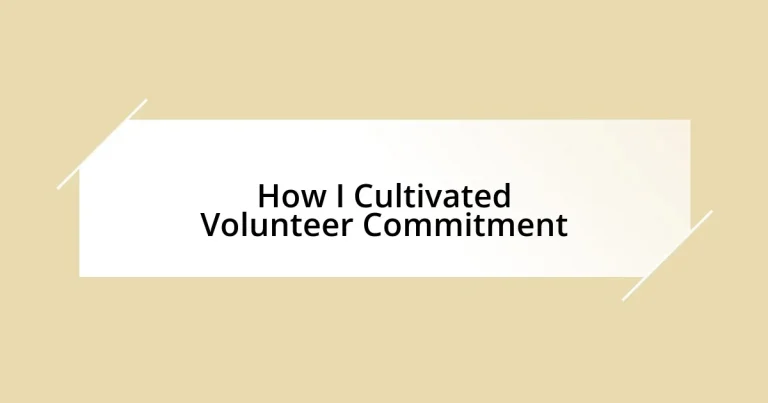Key takeaways:
- Volunteer commitment is driven by emotional investment, shared values, and community support, transforming simple acts into lasting dedication.
- Creating a supportive environment with open communication, recognition, and learning opportunities fosters deeper connections among volunteers.
- Effective communication, including feedback and storytelling, enhances engagement and strengthens bonds within the volunteer community.
- Regularly evaluating engagement and recognizing volunteers through appreciation events and tangible rewards boosts motivation and commitment.
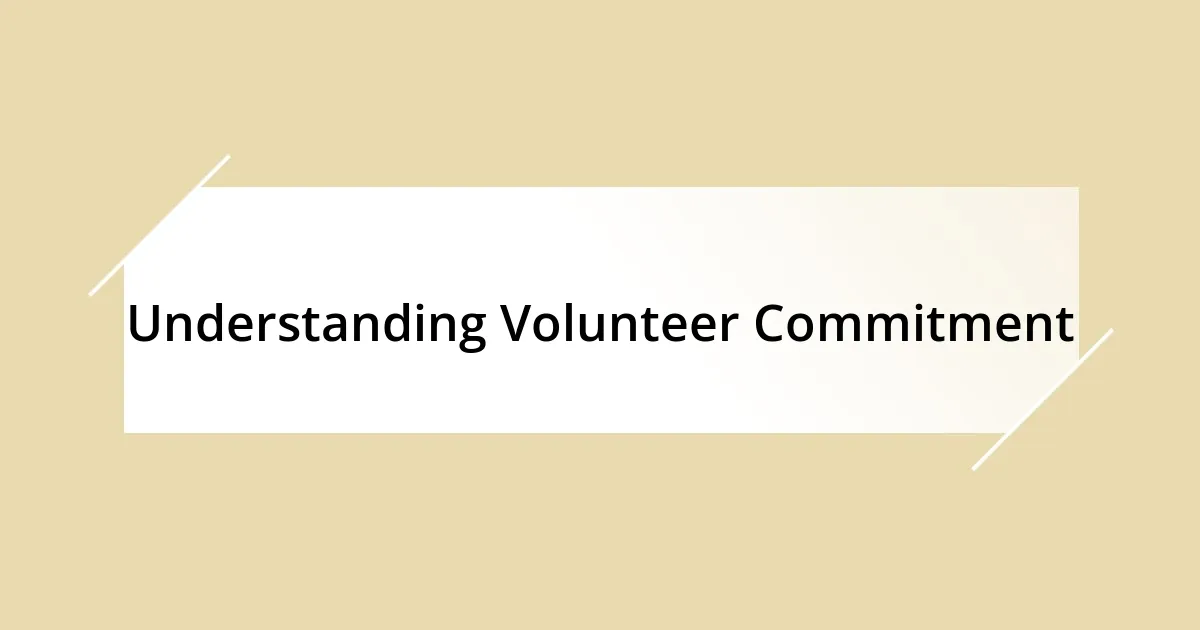
Understanding Volunteer Commitment
Understanding volunteer commitment goes beyond mere participation; it’s about fostering a genuine connection to the cause. When I first began volunteering at my local animal shelter, the initial excitement was palpable, but I quickly realized that true commitment requires emotional investment. It made me ponder—what drives us to dedicate our time and energy for something greater than ourselves?
From my experience, volunteer commitment often stems from shared values and a clear understanding of the mission. At the shelter, I found that knowing how my efforts directly helped the animals created a sense of purpose that kept me coming back, even when the work was tough. Have you ever felt that rush of fulfillment when you see your impact? Those moments resonate deeply and transform a simple act of kindness into a lasting commitment.
Finally, I’ve learned that community support plays a crucial role in sustaining volunteer commitment. When I saw other volunteers passionately engaging and encouraging each other, it reinforced my own dedication. It made me think—how can we cultivate this sense of belonging for all volunteers? Building relationships and fostering a supportive environment not only enhances individual commitment but strengthens the entire community’s resolve.
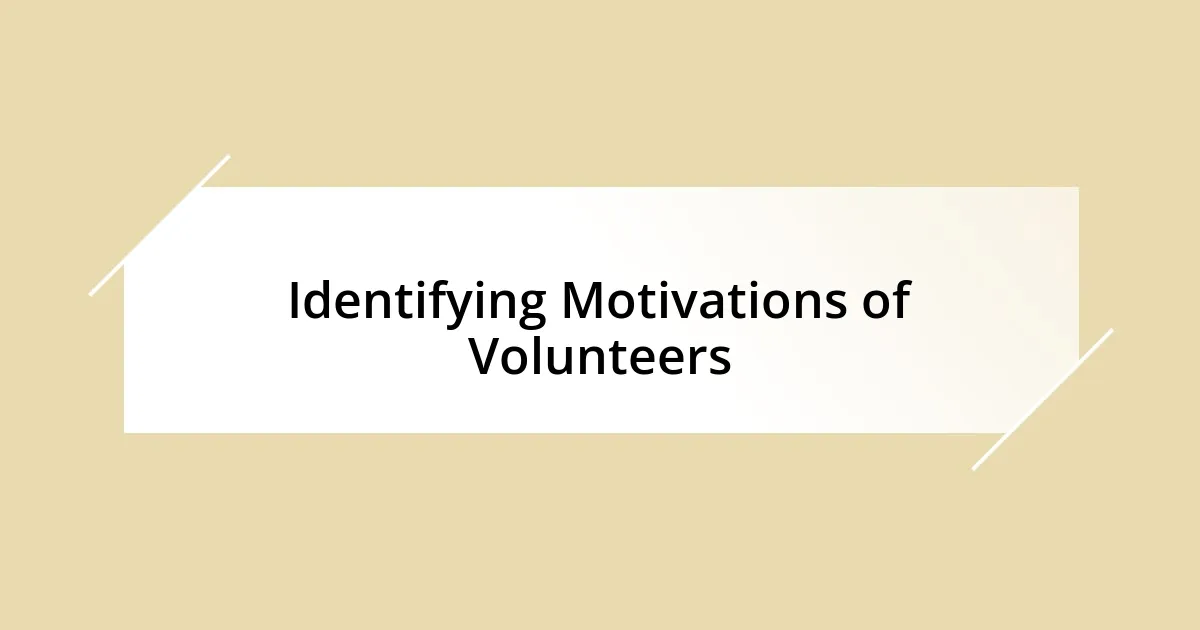
Identifying Motivations of Volunteers
When I reflect on the motivations behind why people volunteer, I realize it often hinges on personal experiences and aspirations. Personally, I found that many volunteers are driven by a desire to give back to their community. This became evident when I chatted with a fellow volunteer who shared that her commitment stemmed from her own upbringing in a neighborhood that heavily relied on community support. Her experience at the shelter allowed her to transform her past challenges into a powerful motivation to provide help to others.
To better understand what motivates volunteers, I’ve observed several common themes:
– Desire to make a difference: Many volunteers seek to create a positive impact in their communities.
– Personal fulfillment: Engaging in meaningful work often fulfills an intrinsic need for purpose and connection.
– Shared values: Volunteers frequently align their personal beliefs with the mission of the organization, reinforcing their commitment.
– Social connections: Building relationships with like-minded individuals can deepen one’s investment in volunteer work.
– Skill development: Some volunteers are motivated by the opportunity to learn new skills or gain experience that can benefit their careers.
Recognizing these motivations not only helps organizations connect with their volunteers on a deeper level, but it also enriches their own understanding of the factors that inspire ongoing commitment. It’s fascinating to see how understanding individual drivers can foster a more robust volunteer culture.
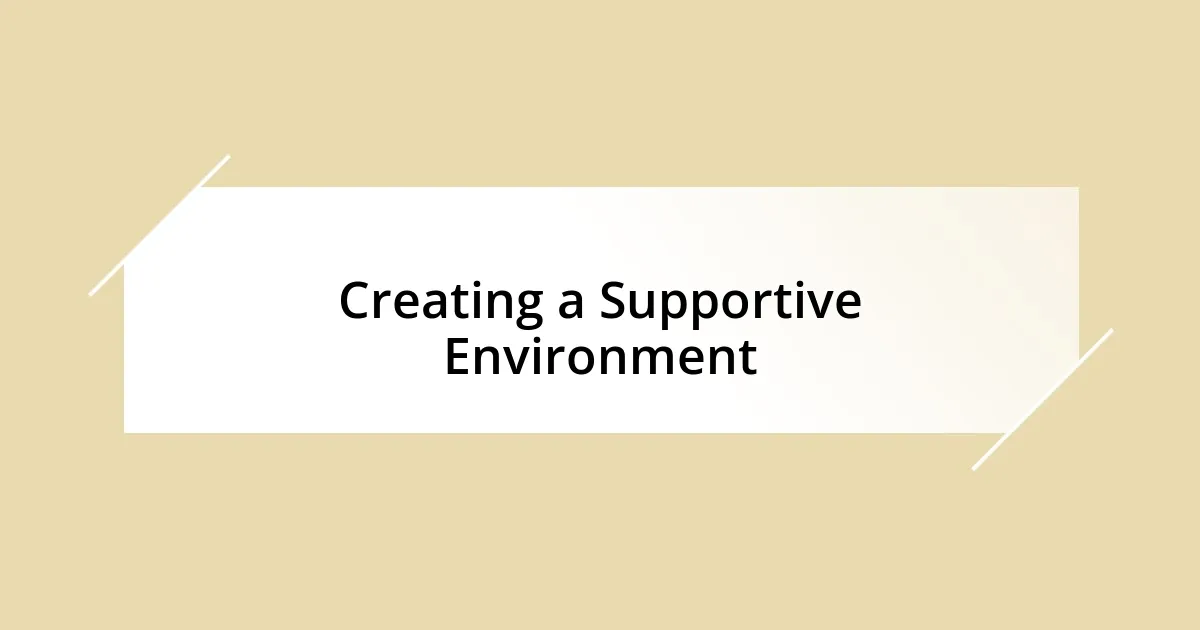
Creating a Supportive Environment
Creating a supportive environment starts with open communication. I remember my first volunteer orientation where the team actively encouraged sharing our thoughts and feelings. It felt refreshing to know that my voice mattered. When volunteers feel heard, it fosters trust and opens the door for deeper connections, which I’ve found is vital for long-term commitment.
On a different note, recognizing individual contributions can significantly enhance a sense of belonging. I once received a handwritten thank-you card from a fellow volunteer after a particularly challenging event. It was a small gesture, but it made me feel valued and connected. Creating an environment where appreciation is regularly expressed not only motivates volunteers but solidifies their role within the team.
Lastly, providing opportunities for learning and growth can create an engaging atmosphere. During my time volunteering, I participated in various workshops that helped me develop my skills. I vividly recall one workshop focused on animal behavior; the knowledge we gained was thrilling. When volunteers are given the chance to learn, it increases their investment in the mission and encourages them to stay committed.
| Element | Description |
|---|---|
| Open Communication | Create a space where volunteers feel comfortable sharing their thoughts and feedback. |
| Recognition | Acknowledge individual contributions to foster a sense of belonging and value. |
| Learning Opportunities | Provide skill development workshops to deepen commitment and engagement. |
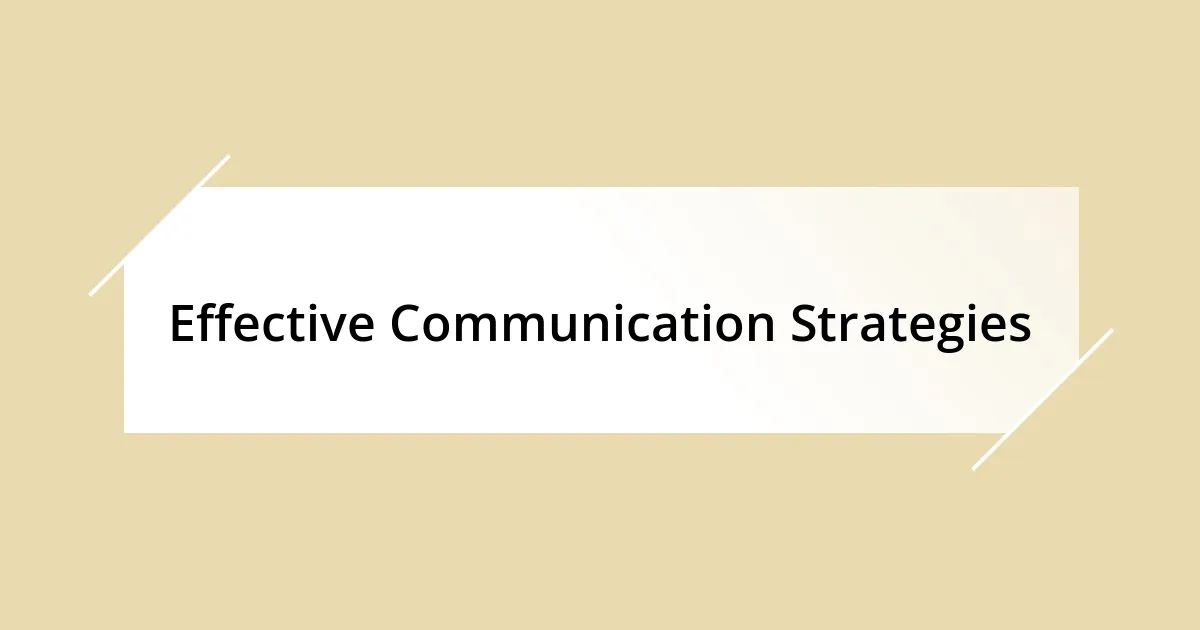
Effective Communication Strategies
Effective communication is crucial in fostering volunteer commitment. I recall a poignant moment during a monthly meeting when our coordinator invited feedback on our projects. It was empowering to share ideas and see them valued. Have you ever felt that rush of enthusiasm when your input is recognized? That sense of ownership not only fuels creativity but solidifies our bond as a team, ensuring everyone feels equally invested in our mission.
Moreover, harnessing different communication tools can enhance engagement. I learned this when we started using a group messaging app. It transformed how we connected, enabling quick updates and fostering continuous dialogue. The immediacy of chatting made our interactions feel less formal and more like a community of friends working toward a shared goal. Isn’t it remarkable how technology can bridge gaps and create a more inclusive atmosphere?
Lastly, I find that storytelling can be a powerful communication strategy. Sharing personal experiences can ignite passion and empathy among volunteers. I remember listening to a fellow volunteer describe how a single event changed her perspective on community service. Her vulnerability in sharing her journey inspired many of us to reflect on our own stories, deepening our commitment. Have you ever felt moved by someone’s story? It’s those moments that remind us of the profound impact we can have on one another.
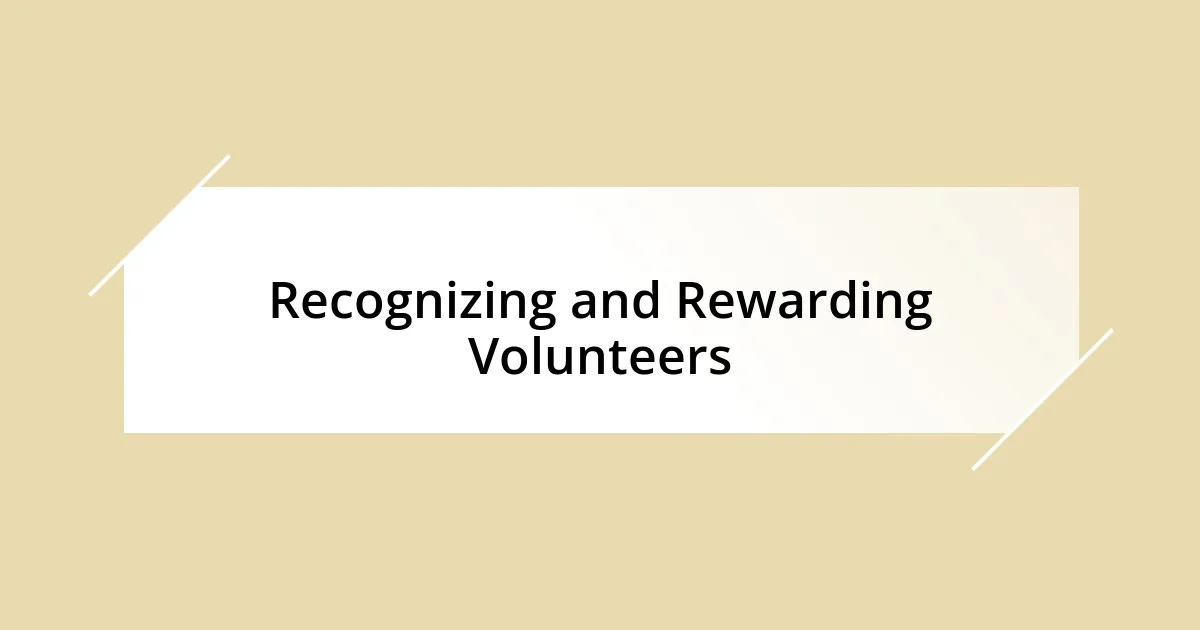
Recognizing and Rewarding Volunteers
Recognizing and rewarding volunteers is essential for maintaining their enthusiasm. I remember when our team organized a small appreciation day. It was a casual gathering, but recognizing our efforts with awards, even silly ones like “Best Snack Provider,” made everyone burst into laughter and feel valued. Do you think we sometimes underestimate how important it is to celebrate even the little things?
One thing that struck me was how a simple shout-out during our meetings could uplift everyone’s spirit. I recall the moment when our coordinator highlighted my contribution to a project — it felt amazing to be seen. It created a ripple effect where others also began to share recognition, turning our group into a more supportive environment. What would happen if we made gratitude a regular practice?
In my experience, tangible rewards can also amplify commitment. For instance, when our organization partnered with local businesses to provide discount coupons for our volunteers, it felt like a win-win situation. Being rewarded in a practical way showed that our contributions were acknowledged beyond mere words. Have you ever felt that extra spark of motivation when a small token of appreciation came your way?

Building Long-Term Relationships
Building long-term relationships with volunteers takes time and effort, but the rewards are immense. I remember a project where we regularly paired new volunteers with seasoned members. Watching those connections deepen over time was magical. Do you recall times when a simple partnership transformed your outlook? These relationships not only enhanced our teamwork but created a shared sense of belonging.
One experience stands out in my mind. During a community outreach event, I noticed a new recruit feeling a bit overwhelmed. So, I took a moment to sit down with her and share my own initial struggles. This small gesture opened up a heartfelt exchange, paving the way for her to connect more deeply with the group. Isn’t it interesting how vulnerability can turn strangers into friends? When we invest in each other’s journeys, we build a solid foundation for long-lasting commitment.
Additionally, I’ve learned that regular check-ins can make a significant difference. After our events, I often reached out to volunteers for a quick chat, not just about their tasks but how they felt about their involvement. These conversations led to unexpected insights and strengthened our bond. Have you ever found that simple conversations can lead to profound revelations? By prioritizing these connections, we create an environment where volunteers truly feel valued and engaged.
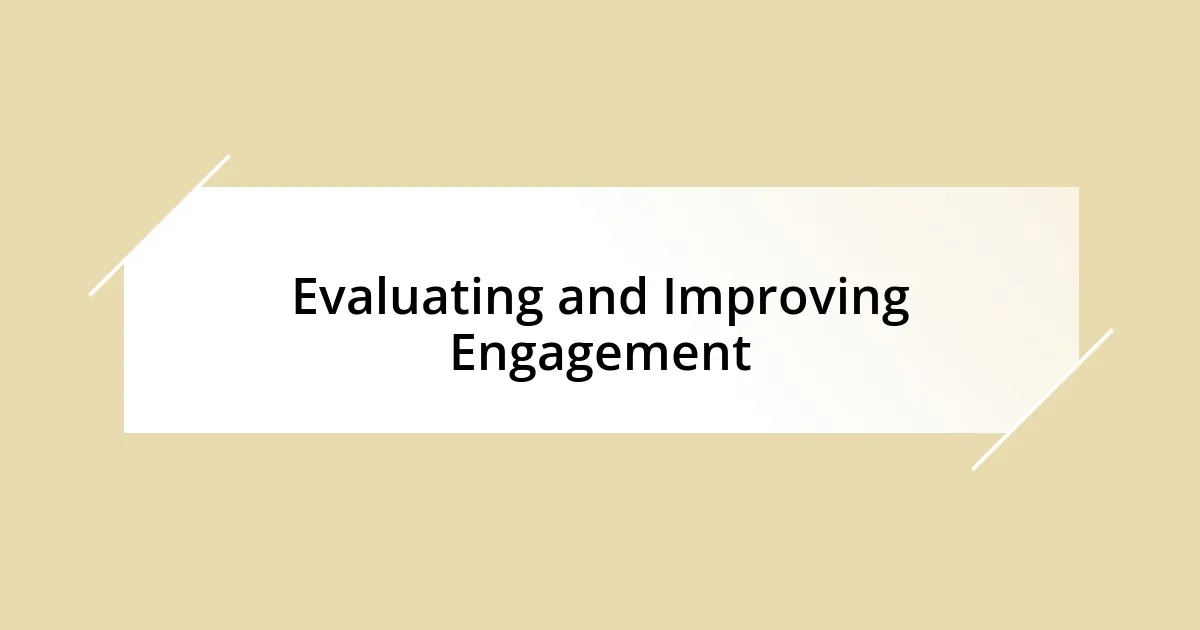
Evaluating and Improving Engagement
Evaluating volunteer engagement has been a game-changer for me. I’ll never forget the time I created a simple feedback survey after a major event. The responses poured in, and while some were positive, others highlighted areas for improvement, like communication before the event. How often do we settle for surface-level satisfaction instead of digging deeper? The insights we gathered shaped our future events and made volunteers feel invested in the process.
Through this process, I learned that evaluating engagement isn’t just about collecting data; it’s about showing volunteers that their voices matter. After analyzing the feedback, I hosted a discussion where we could brainstorm solutions together. During this meeting, I watched as people opened up about their experiences, and I felt the atmosphere shift. Have you ever witnessed a moment when participants truly felt heard? That change in dynamic can lead to a more committed and passionate team.
I constantly strive to improve engagement by experimenting with different strategies. For instance, we’ve introduced themed appreciation weeks, where volunteers could share their stories and experiences. I remember the heartwarming stories that unfolded; one volunteer even spoke about how joining our team helped her overcome personal challenges. Isn’t it powerful when volunteers articulate their journeys? These experiences not only enhance involvement but also foster a sense of community that keeps everyone committed over the long haul.












